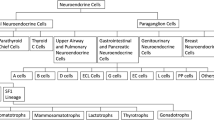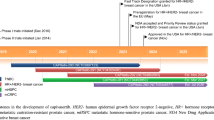Abstract
Reduction in receptors for epidermal growth factor (EGF) in cancers appears to be one of the principal mechanisms through which peptide hormone analogs can inhibit tumor growth. In this study, hamsters with nitrosamine-induced pancreatic cancers were treated for 8 weeks with bombesin/gastrin-releasing peptide (GRP) antagonist RC-3095, somatostatin analog RC-160 or the luteinizing hormone-releasing hormone antagonist Cetrorelix, using sustained delivery systems releasing 20, 35 and 20 μg analog/ day respectively. To establish the pattern of changes in the number and affinity of EGF receptors on tumors, groups of animals were sacrificed at regular intervals during therapy. Chronic treatment with RC-3095 or Cetrorelix resulted in an early (day 10) and sustained reduction (71% or 69% respectively) in EGF receptors on pancreatic tumors. In contrast, RC-160 decreased receptor concentration by 60% only after 20 days. Among the histological characteristics of proliferation, the decrease in argyrophilic nucleolar organizer regions, but not apoptotic and mitotic indices, showed a correlation with the fall in EGF receptors. The concentration of the receptors returned to the control level 4 days after cessation of chronic treatment with RC-3095. The effect of single injections of RC-3095, RC-160 and Cetrorelix on EGF receptors was also investigated. RC-160 decreased the number of EGF receptors on pancreatic cancers by 31% 3 h after administration, but the receptors had returned to normal level at 6 h. RC-3095 and Cetrorelix caused a 67% and 59% decline, respectively, in EGF receptors only 6 h after injection and the concentration of receptors remained low for 24 h. Thus, the pattern of down-regulation of EGF receptors in pancreatic cancers appears to depend on the peptide used for therapy. Since the antitumor effect may be the result of the fall in EGF receptors in cancers, information on the time course of changes in these receptors during treatment with these analogs may lead to an improvement in therapeutic regimens.
Similar content being viewed by others
Author information
Authors and Affiliations
Additional information
Received: 8 April 1998 / Accepted: 9 April 1999
Rights and permissions
About this article
Cite this article
Szepesházi, K., Halmos, G., Schally, A. et al. Growth inhibition of experimental pancreatic cancers and sustained reduction in epidermal growth factor receptors during therapy with hormonal peptide analogs. J Cancer Res Clin Oncol 125, 444–452 (1999). https://doi.org/10.1007/s004320050301
Issue Date:
DOI: https://doi.org/10.1007/s004320050301




